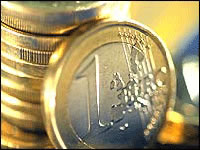EU finance ministers appeared to move closer to a compromise on painful reforms of the rules underpinning the euro - the Stability and Growth Pact - raising the prospects of a deal in March.
Following marathon talks lasting into the night on 17 January and extending into 18 January, Luxembourg's Prime Minister Jean-Claude Juncker, who was chairing the talks, said, "the various positions are moving closer and I hope that we can conclude within the deadline".
He added, "people are abandoning their extreme positions".
Echoing Mr Juncker's optimism, economics and monetary affairs commissioner Joaquin Almunia said there were no "fixed positions" that could scupper a deal.
Political agreement
Political agreement was reached on three main points.
Ministers agreed that the constraints of the Stability Pact - which caps deficit levels at three percent of gross domestic product (GDP) and debt levels at 60 percent of GDP should not be changed.
"Not a single jot or comma of the Treaty is being called into question", said Mr Juncker.
Furthermore, ministers were broadly agreed that the so-called "preventative arm" of the rules should be strengthened. This means that countries will be encouraged to build up budget surpluses in times of strong economic growth - in the hope of avoiding deficits during downturns.
And France, Germany and others seemed to have softened their demands that certain types of "growth-promoting" expenditure should be excluded from the deficit.
Mr Juncker said firmly, "I told Germany and other countries that I would at no stage be prepared to propose such a measure".
Positions softening
Even hardline supporters of the Pact seemed to be softening their positions.
Austrian Finance Minister Karl-Heinz Grasser, who has in the past criticised any attempt to weaken the rules, said that the talks were "very constructive" and that there was "significant progress".
He said he was pleased that all spending would be included in the deficit calculation, stating, "expenditure is expenditure".
Long road to compromise
However, much remains to be agreed. Proposals to give more weight to the debt levels of member states still need to be thrashed out in the face of Italian opposition.
And ministers will have to deal with the tricky issue of the "sanctions mechanism" - the procedure of disciplining countries that fail to adhere to the Pact.
It was the difficulty of punishing big countries like France and Germany that led to pressure to reform the rules and ministers must decide on new ways of enforcing the Pact. This sensitive issue will be discussed at the next meeting of Finance Ministers.
Finance ministers assert control
Following the intervention of German Chancellor Gerhard Schrφder into the debate, with an article in Monday's Financial Times, Mr Juncker seemed at pains to reassert the role of finance ministers in the debate.
He also several times swiped at Mr Schrφder, saying that he was "not in charge of Europe's economy".
France and Germany off hook
Ministers also backed up a recent Brussels assessment that France and Germany should be let off the hook and removed from the disciplinary procedure for repeated breaches of the rules.
On the other hand, ministers agreed to launch tough sanctions against Greece, who deficit is over five percent.
Brussels will issue more recommendations about Athens next month.




 By: N. Peter Kramer
By: N. Peter Kramer
